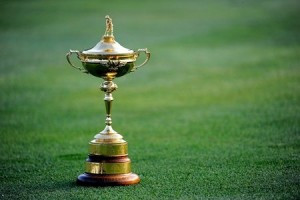On Sunday afternoon, sports fans from around the world witnessed something rare: a win for Team USA at the Ryder Cup. For just the third time in the last two decades, the trophy is returning to the states.
For the higher-ups of American golf, the victory was a cathartic one. After fumbling away a four-point lead on Sunday in 2012 and falling victim to dysfunction in the team room after being blown out in 2014, this year’s version of the American squad looked like a winner from the start of the week at Hazeltine. The team reeled off a 4-0 clean sweep on Friday morning and maintained its lead for the rest of the week, thoroughly demolishing the Europeans in Sunday singles to secure the Cup for the first time in eight years.
For American captain Davis Love III and unofficial team leader Phil Mickelson, this victory was a long time coming. After losing its third Ryder Cup in a row in 2014, the PGA of America established a “Ryder Cup Task Force” consisting of 11 notable names in American golf. Raymond Floyd, Tom Lehman, Jim Furyk, Steve Stricker, Tiger Woods and Rickie Fowler joined Love and Mickelson as current or former players on the committee.
In February 2015, the Task Force announced some adjustments for Team USA’s approach to the 2016 matches in Minnesota. The members unveiled new criteria for the selection of vice-captains and made changes to the captain’s pick process. They also announced that Love would reprise his 2012 role as skipper.
Fast forward to Team USA’s victory on Sunday, and the narrative almost appears to write itself. Hungry for a win after more than a half-decade of futility, the Americans put their heads together, changed their approach to team match play and gained the edge over a stagnant Team Europe, allowing them to cruise to their most decisive Ryder Cup triumph since 1981.
With all due respect to the Task Force, that narrative could not be more off-base. While Team USA shook up its team selection process, none of the changes they made ended up having a major effect on what took place last week. Instead, the big win had everything to do with the composition of the European team, which has entered a transitional phase after enjoying a long period of dominance.
Consider that in 2012, Team Europe’s lowest-ranked player and lone rookie was Nicolas Colsaerts of Belgium, the world No. 35 who needed a captain’s pick after nearly making the squad on merit. The Europeans had four top 10 players, the same number as the Americans, but the latter squad also featured four Ryder Cup rookies.
Last week’s teams looked completely different. Team Europe featured six first-time Ryder Cuppers, as well as five players ranked outside the top 40 in the world. While there were definitely bright spots — Thomas Pieters, in particular, looked like he can be a stud for years to come — they were hard to come by. Englishmen Danny Willett, Chris Wood, Matthew Fitzpatrick and Andy Sullivan played every bit like the rookies they were, mostly sitting on the bench during the first four sessions before getting destroyed in singles.
The Americans, meanwhile, were more than up to the task of winning the Cup. With just two rookies on their roster, they had enough experience to cruise to victory, and what’s more, their weakest player was Ryan Moore, ranked 31st in the world.
What’s behind this sudden reversal of fortune? As we see in football, baseball and basketball, teams experience dominant periods as well as brutal postseason droughts, and it often comes down to luck and circumstance. In golf, the only difference is the scarcity of team events. It seems that the 2016 Ryder Cup simply caught the Europeans at a bad time.
With former match play studs like Ian Poulter, Luke Donald and Graeme McDowell falling off the radar in recent years, Team Europe was without several of its most experienced would-be players. Furthermore, veterans Lee Westwood and Martin Kaymer were horrific last week, combining for just one point in seven matches. While Fitzpatrick and Pieters look like they could be standard bearers for years to come, the next generation of European golf has yet to fully arrive, resulting in a top-heavy team with no real depth.
The post-Tiger Woods American team, meanwhile, appears to have finally reached maturity. Team USA featured an average of four rookies from 2010 through 2014, but Moore and Brooks Koepka were the only first-timers last week. Meanwhile, players like Patrick Reed, Dustin Johnson, Jordan Spieth, Matt Kuchar, Rickie Fowler, Brandt Snedeker and Jimmy Walker — all of whom made their Ryder Cup debuts within the last six years — made big contributions to the team win. Armed with experience and plenty of scar tissue, it was their time to close it out.
So by all means, American fans, celebrate the recent win, but don’t attribute it to the Task Force. Thanks to the career arcs of various players, the Ryder Cup was Team USA’s to lose from the beginning.





